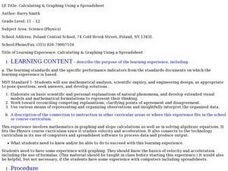Institute of Electrical and Electronics Engineers
Rotational Equilibrium
Physics stars design mobiles that demonstrate rotational equilibrium. They take measurements and solve related equations for force by graphing, substitution, or determinants. This is a well-developed lesson plan, complete with student...
Curated OER
Hardy-Weinberg Equilibrium According to Hoyle: OR, Population Genetics or Platypapyrus foursuitii
Students use this exercise to help achieve a working knowledge of the Hardy-Weinberg Equilibrium without recourse to algebra. After participating in this activity, students gain a feeling for the significance of the Hardy-Weinberg...
Curated OER
Hardy-Weinberg Equilibrium According to Hoyle:
Students gain a feeling for the significance of the Hardy-Weinberg Equilibrium without using algebra but participating in an interactice game.
University of Colorado
Distance = Rate x Time
Every year, the moon moves 3.8 cm farther from Earth. In the 11th part of 22, classes use the distance formula. They determine the distance to the moon based upon given data and then graph Galileo spacecraft data to determine its movement.
Curated OER
The Space Cadet's Laboratory: Using Electromagnetic Energy to Study Astronomy
Young scholars build their own spectrophotometer to study light. In this physics lesson, students explain the dual nature of light. They calculate the angle of incidence and refraction using Snell's law equation.
Curated OER
Bridge Design and Bridge Building
Seventh graders conduct an investigation into the design of bridges and their construction. Students design bridges and draw detailed plans. For assessment they construct a model of a bridge that is made entirely of toothpicks. Students...
Curated OER
Calculating & Graphing Using a Spreadsheet
Students use the lab apparatus to calculate the average velocity and average acceleration at several points and record the data. They use the spreadsheets to plot distance vs. time, velocity vs. time and acceleration vs. time graphs.






